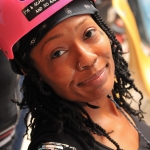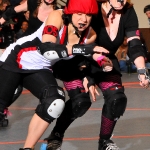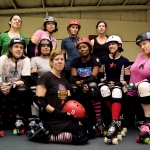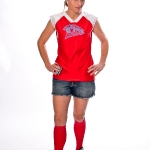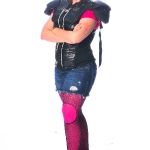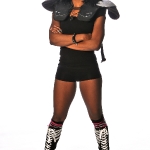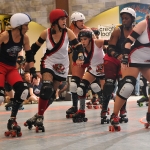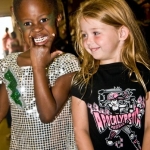An elbow gets thrown into a gut; yells erupt as the jammer sneaks through an opening, moving fast, avoiding eager hands that grab out as she whips past.
A crowd of ravenous, crazy-eyed rollergirls races behind her, moving together like a writhing beast; some blocking to protect her, others roaring forward to prevent her escape. The jammer ducks low, making a sharp left, flying over the start line, scoring several points for her team.
This is the Roller Derby. The sport has been gaining popularity since the early part of the 21st century as women across the country realize the empowering benefits of some serious exercise, a strong female community and a healthy dose of full-contact competition.
What most of us probably never imagine is that many of the women throwing bows at skate parks nationwide are mamas. It’s important for moms to spend time with their girlfriends and to have a hobby, but fellas, Roller Derby ain’t the quilting bee.
Because of the time commitment of practices, marketing and bouts, being a Rollergirl can impact family and professional lives. But these three moms seem to make it work as they lace up their skates each week for the Atlanta league.
“My family is really proud of me,” Hurtie Gertie, who became a Rollergirl in 2008, said one night at the All American Skating Center in Stone Mountain where the league practices. “I think my whole family was really surprised when I told them I was going to try out, but now that I’ve stuck with it, they’re proud.”
Hurtie, whose real name is Trudy Stoddart, is matriarch of your typical nuclear family. She’s married with two kids — a son, Carson (Roller Girl name: The Carson) and a daughter, Emily (Hit- N-Son) — and lives in a quiet East Cobb subdivision. She acknowledges that her schedule can get quite hectic throughout the week, making things difficult at times.
“My husband has been especially supportive,” she said. “I could not do derby without a husband like him. We have no family local, so he has to watch the kids while I go to practice, or team meetings, or publicity outings. He’s great with our kids and has no problem taking care of them while I’m gallivanting around. He’s really proud his wife is an Atlanta Rollergirl!”
Hurtie Gertie works as a managing medical editor for an oncology-based continuing medical education provider – not your first guess, right?
“When they find out I’m a Rollergirl, my co-workers are always surprised. They don’t really expect it out of me.” Hurtie said. “They love it though and think it’s cool. I feel really proud of myself.”
There’s a common misconception that Roller Derby began in the ’70s, especially with the popularity of Kansas City Bombers, which starred Raquel Welch as a hard-up Roller dame. In reality, the Derby began during the Great Depression when a Chicago promoter Leo Seltzer came up with the idea of a skating spectacle to compete with the nation’s dance-marathon craze.
At the time, the sport was an endurance test with two participants, a man and a woman, skating laps one after the other. Sounds dull by today’s standards, but at the time, shows attracted 20,000 people a week.
In 1938, a sportswriter witnessed a bloody street brawl in Miami during a street skate race and suggested to Seltzer that allowing body contact and keeping score would boost attendance even more. It was then that the Derby began morphing into the rumbly, tumbly, jab-fest of today.
The sport thrived throughout the mid-20th century, but by the ’70s it fell off the map. Then, at the beginning of the 21st century, a full-on revival occurred among post-wave-feminists as rollergirls remove passivity from female stereotypes – including those associated with motherhood – by contrasting sexuality, competitive spirit and full-on brutal force.
Today, the Atlanta league is comprised of four teams: Apocalypstix, Sake Tuyas, Denim Demons and Toxic Shocks. There is also an all-star team, the Dirty South Derby Girls, and a minor league team, the Rumble B’s.
Being a member of the league doesn’t only give a mom bragging rights as a pre-eminent badass, she also gets a broad support system of babysitters, teachers and mentors for her kids.
Shannon Nolan, aka “Deathskull,” and Damita “Sk8 Outta Compton” Howard are both veterans of the league whose daughters Elie (Penguin) and Nia (2 Lbs.) have grown up together watching their moms’ bout each week.
“My daughter considers Deathskull her second mom,” Sk8 said as she adjusted her knee pads before practice one night. “I’m in grad school so Deathskull will help me out a lot with Nia; she’ll watch her anytime. Actually, any woman out here would watch Nia if I needed them too. It’s a great community.”
Sk8, who played Eve’s stunt double in the 2009 Drew Barrymore film Whip It, is a single mom (getting her second master’s degree) who became a Rollergirl at a time in her life when she needed stability, support and encouragement.
“[The abuse] put me in the hospital on a Thursday. That following Saturday I was at the rink trying out for the Rollergirls all black and blue,” she said. “These women, well, two in particular, are the reason I got out of that relationship. They grabbed onto me and wouldn’t let me go back.”
Being a positive female role model for their young daughters is something these Rollergirls take exceedingly serious, though at times the sport can have negative effects.
“Nia got in trouble at school for knocking kids over,” Sk8 said. “Then she showed me what she was doing – she was playing Rollergirl. She’s been in this rink since she was 1, she loves it.”
Talking to their girls about the difference between playing and fighting is important to both Deathskull and Sk8, though even more so is reiterating the importance of individuality and courage.
“[Elie] likes to pick out her own clothes,” Deathskull, an associate professor of photography, said of her daughter who’s 5. “Sometimes she likes to wear black. Boys get to wear black and so does she!
“I also keep her away from Barbies. If she asks for it, that’s fine, but I don’t present females to her in a stereotypical sense. I want her to have an open mind.”
It’s fairly safe to say that if their kids follow their mothers’ examples, each of them will grow up refusing social constructs and living each day with strength, nerve and a whole lot of speed.
Games are held at the Yaarab Shrine Center, 400 Ponce de Leon Ave., Atlanta, 30308, 404-872-5818, www.yaarabshrine.org. For ticket information, visit www.atlantarollergirls.com.




